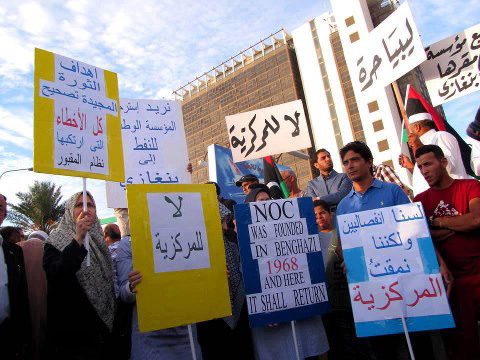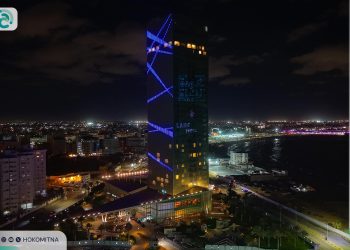By John Hamilton.

London, 12 December:
A union official in Benghazi has rejected oil and gas minister Abdelbari Al-Arusi’s compromise plan to divide . . .[restrict]the National Oil Corporation and to move responsibility for downstream operations to the east. Activists in Libya’s second city have imposed an ultimatum on Tripoli saying that a decision to move the entire headquarters of the company must be taken by 17 February next year.
Oil and Gas Workers Union chief Yousef Ghariani told the Libya Herald on 11 December that “If they don’t meet this date there will be another revolution here”. He said he had delivered this message to Arusi, adding “We will take our rights in our hands”.
Agoco employee and local activist Sami Namer supported Gheriani’s stance, describing the oil ministry’s proposal of splitting the NOC and moving the refining and petrochemicals half of the business to Benghazi as “just another game they are playing. We are talking about control over money – not petrochemicals”. He said that if the 17 February deadline was not met, Agoco workers would “take harsh action to be on our own,” suggesting the company would split itself from NOC authority.
He said other companies in the east such as Marsa al-Brega-based Sirte Oil Company (SOC) and Ras Lanuf-based Ras Lanuf Oil and Gas Processing Company (Rasco) might do the same thing. Arusi recently told Reuters, “We got good feedback from people … After we get the approval, we will start immediately. We are going to do it in phases.”
Gheriani said the union’s position was not that of Agoco chairman Ahmed El-Magbry but that it represented workers at Agoco, SOC, Rasco and Zueitina Oil Company. The activists have so far stopped short of threatening to shut off oil production. “We have not thought about stopping production. The oil doesn’t belong to Benghazi but to all the people of Libya,” said Gheriani.
Workers’ protests have become an effective way of changing policy both in the oil sector and elsewhere since the end of Qaddafi rule. Over the past year, there have been strikes at Waha Oil Company, Akakus Oil Operations and Az-Zawiya Oil Refining Company and others. These have resulted in changes of senior management and other policy changes. In early December the Ministry of Defence sent a delegation to Fezzan to negotiate with protestors who are holding a vigil at the Akakus’s Sharara oil fields in Awbari. They are demanding that one quarter of oil revenues from Fezzan – where oil is produced from the Murzuq Basin – should be used for local economic and social development.
John Hamilton is a contributing editor at African Energy (www.africa-energy.com and a director of Cross-border Information www.crossborderinformation.com) [/restrict]









